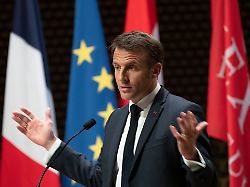At speech in The Hague
Macron insists on “European sovereignty”
04/11/2023 10:02 p.m
After French President Emmanuel Macron caused irritation with statements about the Taiwan conflict, his speech in The Hague was eagerly awaited. He doesn’t respond to criticism, but he renews his call for more “European sovereignty”.
French President Emmanuel Macron has caused an international sensation with his statements on the Taiwan conflict. Criticism hails from Germany, while China, on the other hand, welcomes Macron’s statements. In a keynote speech in The Hague, Macron did not respond to public criticism, but renewed his call for more European sovereignty. The question arises: has the French head of state gone too far with his desire for European independence, has he simply been misunderstood – or is he looking for a debate?
The bone of contention is an interview published on Sunday that Macron gave on the flight back from his state visit to China. On the conflict over Taiwan, Macron said: “The worst thing would be to think that we Europeans should be followers on this issue and adapt to the American rhythm and a Chinese overreaction.” Accordingly, it would be a trap for Europeans to be trapped in foreign crises at a time when their own strategic position was being clarified. Europe then threatens to be a vassal between the USA and China, although one can be a third pole.
Macron received clear criticism from Germany for this. The CDU foreign politician Norbert Röttgen even judged that Macron seemed to have lost all good spirits. He is isolating himself in Europe. Heavy criticism also came from the SPD and the FDP. Federal Minister of Justice Marco Buschmann did not mention Macron by name, but wrote on Twitter that in a time of authoritarian challenges, all states that value freedom and democracy should cooperate even more closely.
Accusation: Timing and context are catastrophic
The communist leadership in Beijing regards the independently governed Taiwan as part of the People’s Republic and threatens to conquer it. Since the Russian invasion of Ukraine, there have been growing concerns that China could take similar military action against Taiwan. The conflict over the democratic island republic is a central issue between China and the USA. Washington has been committed to Taiwan’s defense capability since 1979, which has so far mostly meant arms deliveries.
The French political scientist and Taiwan expert at the Fondation pour la Recherche Stratégique, Antoine Bondaz, accused Macron in the newspaper Le Point: “The timing and the context are catastrophic. He comes back from Beijing, hasn’t even criticized China and shoot at the United States.” In the Élysée Palace, however, nobody wants to know anything about it and sees the interview statements in line with Macron’s well-known demands for European sovereignty. In addition, France is not equally distant from the USA and China. While the US is an ally, China is a partner but also a systemic rival. Macron wants to maintain the stability of the international order and prevent an increase in “risks” in the Taiwan conflict. He clearly told China’s head of state and party leader Xi Jinping that the issue had to be clarified through dialogue.
Against this background, Macron’s speech in The Hague was eagerly awaited. The pandemic and Russia’s war of aggression against Ukraine have made it clear that Europe needs to reduce its dependencies in order to maintain its identity, the president said. Defending sovereignty means being able to choose your partners and shape your own destiny. “We can do that in a collaborative way that reflects our spirit of openness and partnership.”
Macron is not the first time to offend
The statements made by the French President in the interview fit perfectly into the world view of the communist leadership in Beijing. In the conflict over Taiwan in particular, it is important for China to drive a wedge between Europe and the USA. A Chinese military operation against Taiwan would trigger massive international sanctions against China, which would have to be supported by the Europeans. China also wants to prevent the US from even bringing troops to help the Taiwanese – it would be helpful if support in Europe wobbled.
China is also looking at the world through the lens of its geostrategic rivalry with the US. It is constantly demanding more autonomy and independence for Europe, because by inciting Europe against its ally, the USA, Beijing wants to weaken the West-backed rules-based world order and expand its influence. Macron’s statements are almost celebrated there.
For Macron, it is by no means the first time that he has offended with his statements: he was criticized when he attested to NATO’s “brain death” in 2019, and also when he said last summer that Russia should not be humiliated to be able to find a way out through diplomatic channels once the fighting in Ukraine has ended. But maybe that’s strategy and France’s head of state wants to stimulate a debate with exaggerated statements. In any case, he defended his criticism of NATO last year with the argument that it had triggered a strategic consideration of how the alliance should function.
